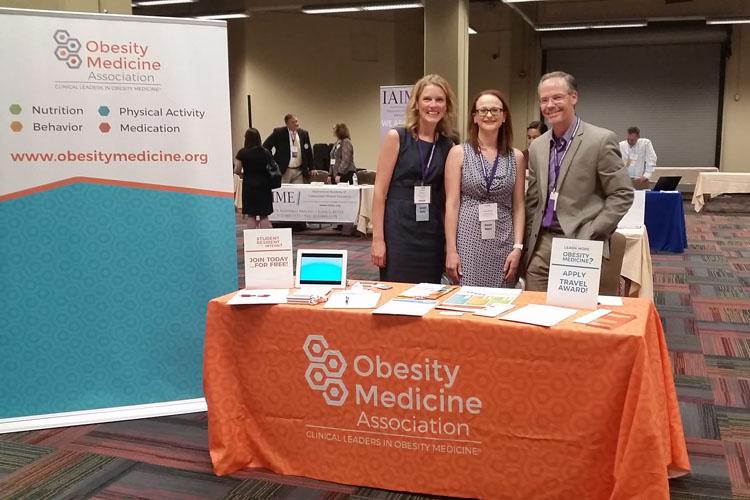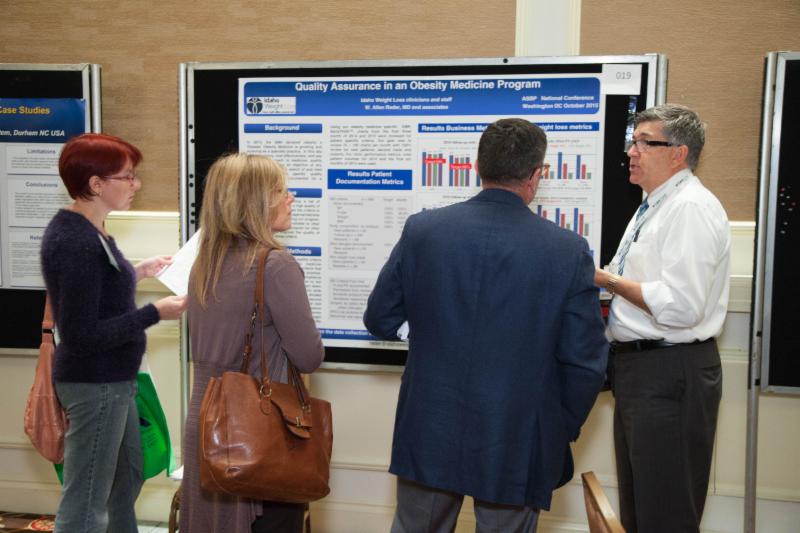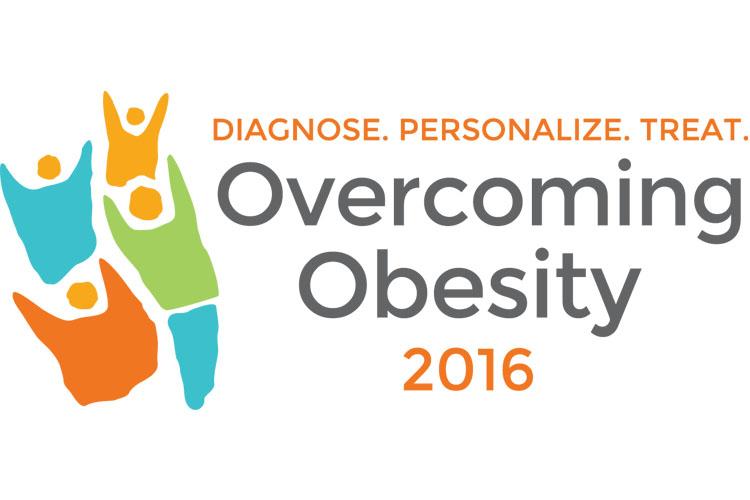Dr. Asher, OMA Founder, Passes Away at Age 87
Dr. Wilmer Lee Asher (Bill) passed away last Tuesday. Dr. Asher founded the National Obesity Society in 1950, which evolved to become what is now the Obesity Medicine Association. By the end of its first year, the National Obesity Society had 25 members. Dr. Asher dedicated the entirety of his medical career to obesity medicine. He graduated from medical school in 1961 and started his first "weight-control" practice in 1964, following an internship in Denver.
Even as the organization evolved, Dr. Asher regularly attended conferences and remained committed to the betterment of the field of obesity medicine. He came to his last conference in Denver in 2015. We thank Dr. Asher for everything he did for the field of obesity medicine, and continue to honor his memory through the Dr. W. L. Asher and Dr. Peter G. Linder Lecture held at every conference.
|
 |
 Report from the 2016 AMA Annual Meeting
Special guest column by Drs. Ethan Lazarus, Carolynn Francavilla, and Michael Knight.
We are pleased to report back to OMA members from the 2016 annual meeting of the American Medical Association (AMA) that took place in Chicago June 11-15. OMA was well-represented, not only by us, but by staff too, including our executive director, Laurie Traetow. One highlight of the meeting was the obesity caucus, which OMA founded and hosted again this year. The caucus brought together thought leaders in obesity and directors of other organizations, including the American Academy of Clinical Endocrinologists, Endocrine Society, American Congress of Obstetrics and Gynecologists, American Association of Public Health Physicians, and California Medical Association. We also had representation from both the AMA board of directors and staff. We discussed obesity education, advocacy efforts, and relevant AMA resolutions. At the last meeting, we authored a letter to the AMA asking for them to aid in our lobbying efforts regarding the Treat and Reduce Obesity Act (TROA). The AMA agreed to assist, and AMA staff participated in our last visit to Capitol Hill. This is a great example of how OMA can leverage its influence by taking an active role in the larger medical community. There were many areas of interest debated at this meeting. Resolutions included:
- Calling on the AMA to research the role of fructose (and high fructose corn syrup) in the obesity epidemic
- Calling for parity in payment for eating disorders
- Calling for better coverage of the Diabetes Prevention Program
- Calling for payment to physicians for time wasted on prior authorizations
Other hot topics included a resolution calling on the Centers for Disease Control and Prevention to lift the ban on researching gun violence. This was a direct response to the mass shooting that occurred in Orlando during the AMA meeting. Also, AMA passed policy to utilize its resources to research and halt the spread of the Zika virus. We had a booth in the Medical Student Specialty Symposium, (pictured above) where we spoke to more than 100 medical students who expressed an interest in learning more about obesity medicine. It was a pleasure and an honor to represent OMA at this meeting. We thank each of you who has made a commitment by being a member of AMA. Without your membership in AMA, we would not be allowed to have a delegate. OMA having a voting seat in the AMA house of delegates adds credibility to the field of obesity medicine and boosts awareness among all state and specialty medical societies. If you are reading this but are not a member of AMA yet, we urge you to consider joining so we can retain a seat at the table - we are just barely at the required threshold. With enough OMA members who are also members of AMA, we could double our influence. |
 |
AspireAssist Receives FDA Approval
Last week, the U.S. Food and Drug Administration (FDA) approved a new device to help patients control their calorie absorption. The AspireAssist works by removing one-third of what's in a patient's stomach after they eat through a tube. According to an FDA spokesperson, the device "helps provide effective control of calorie absorption." Learn more about the approval of AspireAssist and read FAQs about the device.
|
 |
 |
|  | Dr. Richard Lindquist accepting the Steelman-Seim Educator Award in 2015 |
Nominate an OMA Member for an Award
Every year at the fall Overcoming Obesity conference, we present awards to members who have demonstrated outstanding service and worked tirelessly on behalf of OMA. We're now accepting nominations for this year's awards. If you know an OMA member deserving of special recognition, complete a nomination form and return it to Rachel Nevers at rachel@obesitymedicine.org. Please complete one form per nominee. The deadline to submit your nominations is July 8. View the list of last year's award winners.
|
|
|
|
Executive Director
Sponsorships and Exhibits Manager
Operations Manager
Education Coordinator
Executive Director of the Obesity Treatment Foundation
|
|
101 University Blvd.,
Suite 330
Denver, CO 80206
|
|
|
 |
Apply Now for Obesity Medicine Certification: The Early Application Deadline is July 15
Physicians with an interest in obesity medicine are invited to sit for the 2016 American Board of Obesity Medicine (ABOM) certification exam. Applications received by July 15 are eligible for a $250 discount. Nearly 1,600 physicians throughout the U.S. and Canada are currently certified. Exam candidates are required to complete 60 CME hours on the topic of obesity in order to qualify to sit for the test. Learn more about the eligibility requirements. Have questions? Contact ABOM directly at info@abom.org or 303-770-9100. If you still need CME hours to apply for the ABOM exam, look no further. We offer live and at-home CME options to help you reach the 60 CME hour requirement. Live Opportunities:- Overcoming Obesity 2016 (30.5 CME)
(Even though the conference takes place after the application deadline, you can submit your registration receipt with your application as proof that you plan to earn the live CME hours.)
At-home Opportunities: All presentations on the Obesity Medicine Academy are eligible. Choose presentations based on your interests, or select one of our bundles:
|
 |
 |
|  | Amy Ingersoll (left) and Dr. Robert Huster on Capitol Hill |
My First Visit to Capitol Hill and Washington, DC
Special guest column by Amy Ingersoll, PA-C
I have to admit, I was quite intimidated with my first trip to the Hill to talk with senators' health legislative staff about obesity. As inconsequential as it sounds, one of my initial concerns was, "I'm not an MD. Will I be able to make an impression being a PA-C? Does OMA really want me there to represent the cause?"
I couldn't have been more wrong. OMA, Chris (OMA's Washington representative), Dr. Robert Huster (member and obesity medicine physician in Missouri), and Francesca (executive director of TOS) made the experience very welcoming and open.
We started the day with Chris catching us up on our goals for the day and reviewing who we were talking to. Chris organizes it so you meet with your state's legislative staff.
We had seven meetings that day, which all started with Chris introducing who we were and why we were there. Then we discussed our goals to get senators to sign on to a resolution to have the first week in November designated "National Obesity Care Week" and to gain Senate support for the Treat and Reduce Obesity Act.
By the end of the day, all my fears were gone and replaced with frustration. It was incredibly eye-opening to see why it takes so long to change policy. Something as simple as getting Senators to sign on to a resolution seemed like we were asking the world of them. I foresee a long road ahead of continued effort to help change health care policy on treatment and coverage of obesity, and I know OMA will continue to lead the way with advocacy.
|
 |
Obesity Treatment Foundation
|
 Submit Your Abstract as an Oral or Poster Presentation at Overcoming Obesity 2016 Submit Your Abstract as an Oral or Poster Presentation at Overcoming Obesity 2016
|
Pediatric Obesity Research Update
|
Attention Deficit Hyperactivity Disorder and Disordered Eating Behaviors: Links, Risks, and Challenges Faced
Ptacek, et al. Neuropsychiatric Disease and Treatment, 2016. 12: 571-579.
The prevalence of ADHD is about 5.3% within the pediatric population. Rarely an isolated diagnosis, ADHD is often associated with other comorbidities, including depression and anxiety. In the past decade, eating disorders have often been diagnosed in individuals with ADHD. The main eating disorders associated with ADHD are binge eating disorder (BED) and and bulimia nervosa (BN). Continue reading
|
 |
Changes in Pediatric Waist Circumference Percentiles despite Reported Pediatric Weight Stabilization in the United States
Fernandez, J. R., et al. Pediatric Obesity, 2016.
Body weight and BMI do not always reflect changes in body composition of a population. A study was conducted to describe trends in waist circumference (WC) among children in the United States from 2009-2014 using NHANES2014 data. Results showed that WC increased in African-American, European-American, and Mexican-American boys and girls when compared with NHANESIII data. Waist circumference values that were in the 90th percentile in NHANESIII are now in the 85th percentile. Additionally, despite a stabilization in body weight for European- and Mexican-American boys, WC still increased. Given that WC is an important marker for metabolic risk, including this anthropometric measure in population data provides a clearer picture of the health of U.S. children. View article
|
Effect of a High-fat Mediterranean Diet on Body Weight and Waist Circumference: A Pre-specified Secondary Outcomes Analysis of the PREDIMED Randomized Controlled Trial
Estruch, R., et al. The Lancet, 2016.
Given the high energy density of dietary fat, many health care providers are unwilling to prescribe high-fat diets in fear that they may cause weight gain in their patients. A study was conducted using data from the PREDIMED trial to assess the long-term effects of ad libitum high-fat, high-vegetable-fat Mediterranean diets on body weight and waist circumference. The study found that after about five years of follow-up, the control low-fat group, the "Mediterranean diet + olive oil" group, and the "Mediterranean diet + nuts" group all had reduced body weight and increased waist circumference. Compared to the control group, the olive oil group weighed 0.43 kg less and the nut group weighed 0.08 kg less, and waist circumference was 0.55 cm and 0.94 cm less than control, respectively. These findings suggest that unrestricted high-vegetable-fat intake with a Mediterranean diet is beneficial for decreases in body weight and helps to gain less abdominal adiposity over time. These findings indicate that health care providers should consider not restricting vegetable fats for their patients to help with body weight regulation. View article
|
Development and Initial Validation of the Obsessive-Compulsive Eating Scale
Niemie, M. A., et al. Obesity, 2016.
Food cravings are a common problem with body-weight regulation. A tool to measure the obsessive-compulsive aspects of food cravings was recently studied. The 14-item Obsessive-Compulsive Eating Scale (OCES) was developed based on the validated Obsessive-Compulsive Drinking Scale and was administered to 224 respondents (n=128 women). The tool includes questions such as: "How much control do you have over your desire to eat your avoided food?" "How strong is the drive to consume your avoided food?" "How much of an effort do you make to resist consumption of your avoided food?" Results showed that OCES had excellent internal consistency (Cronbach's alpha=0.91) and demonstrated good convergent and criterion validity. This tool may be a useful addition to baseline body measurements when providing care for patients with obesity. View article
|
 |

Overcoming Obesity 2016: Chicago, Sept. 21-25
Overcoming Obesity 2016 is your primary source for clinical obesity education. This fall we're offering the Review Course for the ABOM Exam -- the course preferred by physicians to help them prepare for the obesity medicine certification exam -- and the Fall Obesity Summit, which contains an all-new lineup of topics and speakers. Overcoming Obesity 2016 takes place in Chicago on Sept. 21-25. Register online now! |
Review Course for the ABOM Exam
13 CME/CE | Sept. 21-22
Helps prepare those planning to take the American Board of Obesity Medicine (ABOM) certification exam.
| Fall Obesity Summit
17 CME/CE | Sept. 23-25
Addresses topics related to the clinical treatment of obesity and obesity-related conditions.
|
|

Obesity Medicine Basics
Obesity Medicine Basics returns this summer to four cities around the country. This introductory-level course is an opportunity for us to spread the word about obesity medicine to providers in a primary care setting. As a member of OMA, you can earn rewards by referring others to attend Obesity Medicine Basics. Your efforts referring your colleagues to this course will help grow the field of obesity medicine and increase the number of health care professionals with a basic understanding of how to treat obesity. Upcoming Courses: |
|
|
|
The Obesity Medicine Association and the Obesity Treatment Foundation thank our 2016 Corporate Advisory Council members for their continuous support.
|
© 2016 Obesity Medicine Association. All rights reserved. Materials may not be reproduced, redistributed or translated without written permission. Advertising disclaimer: Under a policy approved by the OMA executive committee and exhibitor/advertiser review committee, commercial companies may apply to advertise in OMA publications. Approval does not imply endorsement or official recognition of particular products or services.
|
|
|
|